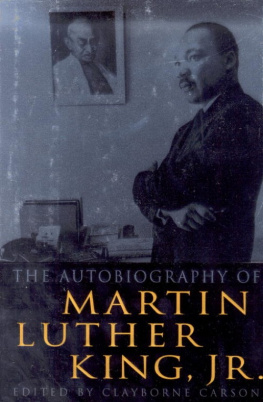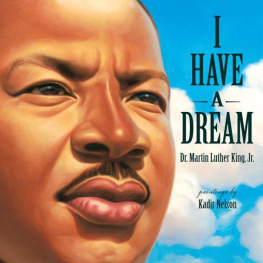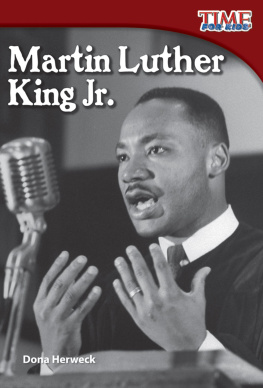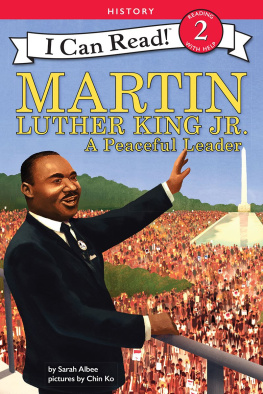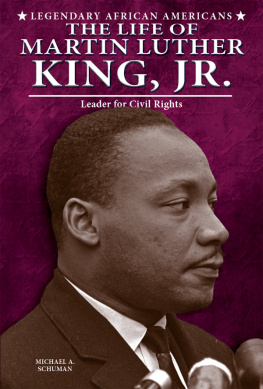THE RADICAL KING
MARTIN LUTHER KING, JR.
Edited and introduced by CORNEL WEST
Beacon Press, Boston
As I have moved to break the betrayal of my own silences and to speak from the burnings of my own heart... many persons have questioned me about the wisdom of my path. At the heart of their concerns this query has often loomed large and loud: Why are you speaking about the war, Dr. King? Why are you joining the voices of dissent? Peace and civil rights dont mix, they say. Arent you hurting the cause of your people, they ask? And when I hear them, though I often understand the sources of their concern, I am nevertheless greatly saddened, for such questions mean that the inquirers have not really known me, my commitment or my calling.
Dr. Martin Luther King, Jr., remarks delivered at
Riverside Church, New York, April 4, 1967
CONTENTS
INTRODUCTION
THE RADICAL KING WE DONT KNOW
The FBI transcript of a June 27, 1964, phone conversation reveals Malcolm X receiving a message from Martin Luther King, Jr. This message supported the idea of getting the human rights declaration of the United Nations to expose the unfair, vicious treatment of black people in America. Malcolm X replied that he was eager to meet Martin Luther King, Jr.as soon as the next afternoon. If they had met that day and worked together, the radical King would be well known.
In a speech to staff in 1966, King explained: There must be a better distribution of wealth and maybe America must move toward a democratic socialism. If he had lived and pursued this project, the radical King would be well known.
On April 4, 1968, in Memphisthe last day of his lifeMartin Luther King, Jr., phoned Ebenezer Baptist Church in Atlanta with the title of his Sunday sermon: Why America May Go to Hell. If he had preached this sermon, the radical King would be well known.
Yet in Dr. Kings own time, he would say repeatedly, I am nevertheless greatly saddened... that the inquirers have not really known me, my commitment, or my calling.
In short, Martin Luther King, Jr., refused to sell his soul for a mess of pottage. He refused to silence his voice in his quest for unarmed truth and unconditional love. For King, the condition of truth was to allow suffering to speak; for him, justice was what love looks like in public. In Kings eyes, too many black leaders sacrificed the truth for access to power or reduced sacrificial love and service to selfish expediency and personal gain. This spiritual blackout among black leaders resulted in their use and abuse by the white political and economic establishment that constituted a kind of conspiracy against the poor. This spiritual blackoutthis lack of integrity and courageprimarily revealed a deep fear, failure of nerve, and spinelessness on behalf of black leaders. They too often were sycophants, cheerleaders, or bootlickers for big monied interests, even as the boots were crushing poor and working people. In stark contrast to this cowardice, King stated to his staff, Id rather be dead than afraid.
Although much of America did not know the radical Kingand too few know todaythe FBI and US government did. They called him the most dangerous man in America. They knew Reverend King was a revolutionary Christian, sincere in his commitment and serious in his calling. They knew he was a product of a black prophetic tradition, full of fire in his bones, love in his heart, light in his mind, and courage in his soul. Martin Luther King, Jr., was the major threat to the US government and the American establishment because he dared to organize and mobilize black rage over past and present crimes against humanity targeting black folk and other oppressed people.
Any such black awakening can either yield hatred and revenge or love and justice. This is why the prophetic words of Rabbi Abraham Joshua Heschel still haunt us: The whole future of America will depend upon the impact and influence of Dr. King. The fundamental question is: Does America have the capacity to hear and heed the radical King or must America sanitize King in order to evade and avoid his challenge?
King indeed had a dream. But it was not the American dream. Kings dream was rooted in the American Dreamit was what the quest for life, liberty, and the pursuit of happiness looked like for people enslaved and Jim Crowed, terrorized, traumatized, and stigmatized by American laws and American citizens. The litmus test for realizing Kings dream was neither a black face in the White House nor a black presence on Wall Street. Rather, the fulfillment of his dream was for all poor and working people to live lives of decency and dignity.
Kings dream of a more free and democratic America and world had morphed into, in his words, a nightmare, owing to the persistence of racism, poverty, militarism, and materialism. He called America a sick society. At one point, King cried out in despair, I have found out that all that I have been doing in trying to correct this system in America has been in vain. I am trying to get at the roots of it to see just what ought to be done. The whole thing will have to be done away with. He was weary of pervasive economic injustice, cultural decay, and political paralysis. He was not an American Gibbon chronicling the decline and fall of the American empire but a courageous and visionary Christian blues man, fighting with style and love in the face of the four catastrophes he identified, which are still with us today.
Militarism is an imperial catastrophe that has produced a military-industrial complex and national security state and warped the countrys priorities and stature (as with the immoral drones dropping bombs on innocent civilians). Materialism is a spiritual catastrophe, promoted by a corporate-media multiplex and a culture industry that has hardened the hearts of hard-core consumers and coarsened the consciences of would-be citizens. Clever gimmicks of mass distraction yield a cheap soulcraft of addicted and self-medicated narcissists.
Racism is a moral catastrophe, most graphically seen in the prison-industrial complex and targeted police surveillance in black and brown ghettos rendered invisible in public discourse. Arbitrary uses of the law in the name of the war on drugs have produced, in legal scholar Michelle Alexanders well-known phrase, a new Jim Crow of mass incarceration. And poverty is an economic catastrophe, inseparable from the power of greedy oligarchs and avaricious plutocrats indifferent to the misery of poor children, elderly and disabled citizens, and working people.
The radical King was a warrior for peace on the domestic and global battlefields. He was a staunch anti-colonial and anti-imperial thinker and fighter. His revolutionary commitment to nonviolent resistance in America and abroad tried to put a brake on the escalating militarism running amok across the globe. As a decade-long victim of the vicious and vindictive FBI, King was a radical libertarian as well as having closeted democratic socialist leanings. His commitment to the precious rights and liberties for all was profound.
For King, dissent did not mean disloyaltyin fact, dissent was a high form of patriotism. When he said that the US government was the greatest purveyor of violence in the world today, he was not trashing America. He was telling the painful truth about a country he loved. King was never anti-American; he was always anti-injustice in America and anywhere else. Love of truth and love of country could go hand-in-hand. Needless to say, under the policies of the National Security Agency and Obama administration, King could have been subject to detention without trial and assassination by executive decree (owing to his links to terrorists of his day, such as Nelson Mandela).
The radical King was a spiritual giant who tried to shatter the callousness and indifference of his fellow citizens. Following his dear friend and comrade Rabbi Abraham Joshua Heschel, King believed that indifference to evil is more evil than evil itself. And materialism, with its attendants hedonism and egotism, produces sleepwalkers bereft of compassion and zombies deficient in love. This spiritual crisis is not reducible to politics or economics. It is rooted in the relative decline of integrity, honesty, decency, and virtue, due in large part to the role of big money in American life. This coldhearted obsession with manipulation and domination drives our ecological catastrophe-in-the-making and our possible military Armageddon.


